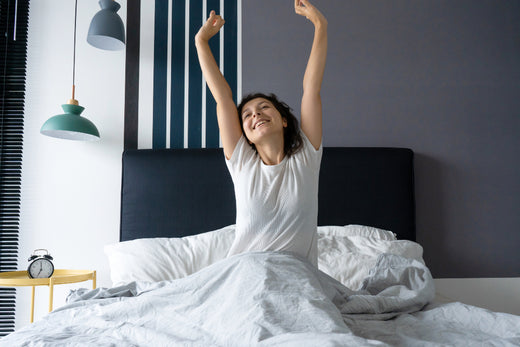
Valerian herbal tea: learn all about the properties of valerian
Valerian is a medicinal plant associated with promoting relaxation and improving the quality of sleep. If you're looking for herbal teas for sleep, herbal teas for anxiety (anxiety is often responsible for making it difficult for us to relax and sleep soundly) or simply herbal teas to relax, a family member or friend is sure to recommend a valerian herbal tea or valerian tea. Used for thousands of years in Europe and Asia for its relaxing and sedative properties, today valerian is one of the most widely recognised and recommended plants for relieving anxiety and mild sleep disorders. In tablet, supplement, essential oil or herbal tea form, valerian can be found on the shelves of pharmacies, chemists, herbalists... and of course, in our kitchen too, in the form of loose-leaf valerian herbal tea. The benefits of valerian are there to be enjoyed – read on to find out more!

Valerian: uses and anecdotes throughout history
The use of valeriana officinalis root, also known as common valerian or medicinal valerian, dates back to Ancient Greece and the Roman Empire. The name valeriana derives from the Latin word "valere" meaning "to be well", "to be healthy and strong" – a fitting name for a plant that was prescribed in folk medicine to treat anxiety, with the aim of returning to a state of mental and physical health and strength.
There are many anecdotes relating to valerian throughout history.
Dioscorides, a Greek doctor, pharmacologist and botanist in the Roman army (1st century AD), in his treatise De materia medica, called it "fu" (Greek for "unpleasant smell").
It was also found that cats were extremely attracted to valerian. The reason was thought to be the strong smell emanating from valerian's root and flowers, hence the origin of the vernacular "catnip” name given to the plant.
There's no denying that valerian has a very unique smell! In fact, when using valerian for sleep, many people add other plants to their valerian herbal teas, such as chamomile, lime blossom, berries or fruits, to alter its scent.
At Tea Shop, we've developed an exquisite valerian-based herbal tea recipe, perfect for enjoying all the magical properties of valerian without giving up the pleasure of a tasty and comforting cup. Our Valeriana Garden herbal tea, for example, alongside valeriana officinalis, contains orange, rose hip, apple, orange blossom, blackberry and raspberry leaves, and sunflower and cornflower petals. A delicious and pleasurable way to relax your body and mind!

In the Middle Ages, valerian was regarded as a panacea, a "cure-all" that people used to treat coughs, menstrual disorders, certain visual impairments, bumps and cuts, and even epilepsy.
Today, however, above all, valerian is most appreciated for its sedative and relaxing properties, making it particularly popular in phytotherapy and natural medicine.
Let's take a look at the benefits of valerian and all the well-being that this powerful plant can bring you.
Valerian properties
- Valerian as a sleep aid
Valerian is one of the most relaxing herbal teas for sleep thanks to its valepotriate (iridoids) content. The iridoids, active ingredients present in plants of the valerianaceae botanical family, are packed full of sedative properties. In phytotherapy, they're used to correct sleep disorders and emotional distress. And it's been proven that regular valerian consumption improves both the ability to fall asleep and its quality.
So, if you're wondering how you’re going to fall asleep tonight, taking valerian about an hour before bed is an excellent option. Valerian is great for sleep!
- Valerian to relieve anxiety
The sedative effect of valerian mentioned above makes it an excellent ally when it comes to reducing nervous tension and anxiety. If you're looking for herbal teas to calm your nerves, you can count on valerian! And valerian also helps to reduce stress and mild symptoms of depression. Depending on the amount taken, and an individual's metabolism, valerian can cause drowsiness, so it's always advisable to take it gradually and assess your body's response.
- Valerian as a muscle relaxant
Valerian stands out among muscle-relaxing herbal teas as an excellent choice for reducing muscle and joint pain, stiffness, cramps, neuralgia and spasms. And did you know… valerian is also commonly used topically to relieve cramps and relax muscles.
- Valerian for menstrual cramps
Just as valerian helps to reduce muscle spasms, it can be of great help in reducing menstrual cramps, as well as the irritability, mood swings and lack of energy associated with PMS.
Precautions to be taken when using valerian
All medicinal plants have active ingredients that can interact with, reduce or increase the effects of other drugs, or interact with particular health conditions or chronic diseases.
In the scientific literature on valerian, you don’t normally find any contraindications, side effects, undesirable effects or warnings and prohibitions for healthy people free of conditions that require particular treatments.
However, it’s still important to consult a doctor if you’re using anxiolytics or antidepressants, for example, because in certain people, valerian can enhance the sedative effects of the medication, or increase its adverse effects.
If you're thinking about taking valerian during pregnancy, things are slightly different, because when you’re pregnant and breastfeeding because everything ingested is excreted through your breast milk. If you’re pregnant or breastfeeding your baby, we recommend asking your doctor for a personalised assessment.
1 comment
Yo uso la valeriana para dormir porque tengo trastorno del sueño además para los dolores de espalda
Esther
Leave a comment
This site is protected by hCaptcha and the hCaptcha Privacy Policy and Terms of Service apply.